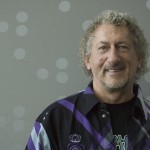
Professor of biology Thomas Landefeld recently presented talks at Tougaloo College in Tougaloo, Miss., and at Truman College in Chicago. His topics, “What makes a good personal statement and why it’s important” and “Making the right career choice in science and how to prepare once you do” were geared toward minority students who are preparing to apply to graduate school. He also spoke on “Making the right career choice in the science and what to do once you make it” at Alabama State University to MARC U*STAR students.
“Programs such as U*STAR enhance the educational experience by exposing students to direct research experiences and, as such, stimulating their independent critical thinking,” says Landefeld. “These programs also enrich the student’s experience through the personalization of efforts and time, thereby recognizing each student as an individual. For underrepresented and minority students, this is critical.”
Landefeld says that a successful personal statement for a graduate school application “really states who the writer is.”
“For graduate school in the sciences, research experience needs to be demonstrated as a major strength,” he says, adding that without research experience as an undergrad, getting accepted at a graduate school is extremely difficult.
“Originality and/or creativity are important as well in characterizing the individual,” Landefeld says. “Committees look at what [a student] will bring to the school and program, as well as how will they contribute effectively to the profession.”
Landefeld says that individual mentoring of students is paramount to their success, combined with providing opportunities in research to enrich their portfolios.
“The location of an institution alone does not guarantee that the students will get the type of assistance that is needed for them to achieve,” he says of the local areas that many HBCUs (Historical Black Colleges and Universities) and HSIs (Hispanic Serving Institutions) serve. “Faculty and staff who have chosen to spend the extra effort and time necessary to assist and mentor their students interested in science careers represent the key components in helping CSU Dominguez Hills achieve the goals of a diverse urban university.”
[Editor’s note: additional information provided after publication, 11/3/2010] Dr. Landefeld also attended the annual conference of the Society for Advancement of Chicanos and Native Americans in Science (SACNAS) last month as a representative of the Minority Affairs Committee of the American Society of Biochemistry and Molecular Biology, and presented a career development session on “What Professional Societies Can Do for You.”For information on opportunities for undergraduate research in the sciences at CSU Dominguez Hills, click here.